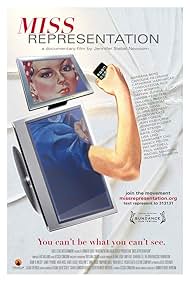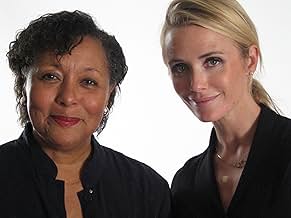Explores the under-representation of women in positions of power and influence in America, and challenges the media's limited portrayal of what it means to be a powerful woman.Explores the under-representation of women in positions of power and influence in America, and challenges the media's limited portrayal of what it means to be a powerful woman.Explores the under-representation of women in positions of power and influence in America, and challenges the media's limited portrayal of what it means to be a powerful woman.
- Awards
- 1 win & 1 nomination
- Self - Associate Professor of Political Science, Occidental College
- (as Caroline Heldman Ph.D.)
Storyline
Did you know
- Quotes
Herself - Associate Professor of Political Science, Occidental College: Women who are high self-objectifiers have lower political efficacy. Political efficacy is the idea that your voice matters in politics and that you can bring about change in politics. So if we have a whole generation of young people being raised where women's objectification is just par for the course, it's normal, it's okay, we have a whole generation of women who are less likely to run for office and less likely to vote.
- ConnectionsFeatures Baby Face (1933)
- SoundtracksHelp, I'm Alive
Written by Emily Haines and James Shaw
Performed by Metric
Courtesy of Metric Music International
Miss Representation's goal is to inform people about the blatant sexism in Television, advertising, society, politics, and film. It does a very nice job at providing each of their subjects with material and substance, also giving them enough time to get their point across. I believe more than eight minutes is devoted to the political aspect, and several more to Television and film. For an eighty-eight minute documentary, it covers a lot of heavy territory, and even, gasp, includes efficient solutions during the end credits.
The interviewees are Geena Davis, Condoleezza Rice, Lisa Ling, Nancy Pelosi, Katie Couric, Rosario Dawson, Jim Steyer, Dr. Jackson Katz, and Gloria Steinem, who all comment on the media's insidiously harmful portrayal of women. Comments are made on how advertising has evolved from genial snippets into racy, sexploitation spots begging to be noticed and controversial. It has been proved in the field of advertising that sex sells, and companies race their commercials and magazine advertisements to an invisible finish line to see who can be more daring and provocative.
But what are the consequences for imposing such demeaning pictures of women? For one, there's the obligatory "striving for unsustainable beauty" argument. I don't think there is one person who believes that what they see on the front cover on a tabloid or a magazine has not been digitally altered or photoshopped in some way, shape, or form. Most likely, all three of those things have been changed on a picture of a woman, and it's not hard to find out. How many women do you know have pearly white skin and don't occupy a single blemish, mole, pimple, or scar? I remember on KISS FM's "DreX in the Morning" radio program they discussed how parental browbeating and mediocre, sometimes abusive relationships affect a woman's already fragile self-esteem and worth. They brought up how on a magazine cover, Brittney Spears' face was photoshopped onto the body she occupied in the nineties.
Miss Representation doesn't break new ground or uncover anything that wasn't pretty much known before, but will likely be useful to teenage girls who are perhaps unaware of the media bias. I unfortunately missed a screening of this at my high school and a lengthy lecture following it. It would've been nice to see audiences reactions in the flesh. I can see some dismissing this as mock-feminist propaganda and I can see people being truly informed and moved by this documentary. Me, I stand where I usually am; in the middle. This is a well made documentary, but not without my personal quibbles and questions. For one, the film mentions that there are very few women directors, screenwriters, cinematographers, etc. Okay, but are women being forced out by the big, bad man, or are they just not showing a genuine interest in the behind the scenes aspects of the film industry? Another thing I must bring up; maybe it's not the studios' fault that women are portrayed so dimly in film. You can't tell me that actresses like Megan Fox and Jessica Simpson don't contract themselves to basically flaunt their stuff in films like The Dukes of Hazzard and Transformers. They know what they're getting into, and appear to have no problem showing what they have. I'm not saying it's right, but maybe the film is too quick to point figures at the provider rather than the person signing the contract and giving consent to be used as a basic caricature.
Director Jennifer Siebel Newsom has done a bold and admirable thing releasing Miss Representation, not only letting it glide its way around the country in screenings, but by giving the distribution rights to The Oprah Winfrey Network. This is an informative and amusing documentary showing us that our biggest source of information also serves as our biggest influence on people, good and bad. I'll leave off with a quote from Jim Steyer, one of my favorite speakers in the film; "It's not a Liberal or Conservative issue; it's an American issue and an American problem." Starring: Geena Davis, Condoleezza Rice, Lisa Ling, Nancy Pelosi, Katie Couric, Rosario Dawson, Jim Steyer, Dr. Jackson Katz, and Gloria Steinem. Directed by: Jennifer Siebel Newsom.
- StevePulaski
- Apr 12, 2012
- Permalink
- How long is Miss Representation?Powered by Alexa
Details
- Release date
- Country of origin
- Official site
- Language
- Also known as
- Miss Escaparate
- Filming locations
- Production companies
- See more company credits at IMDbPro
Box office
- Budget
- $750,000 (estimated)
- Runtime1 hour 25 minutes
- Color
Contribute to this page




























